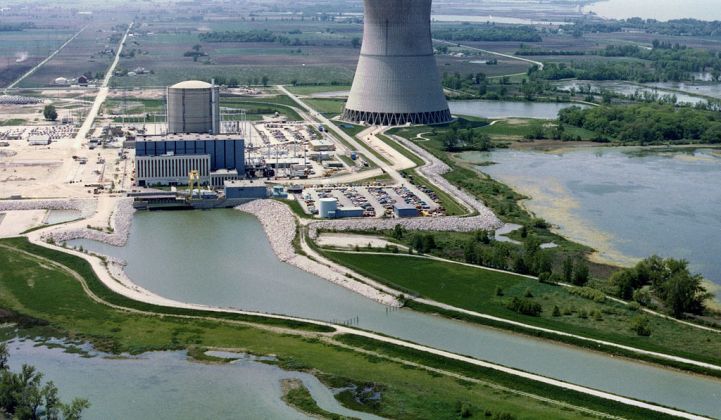Ohio’s House of Representatives passed House Bill 6 in a hastily convened Tuesday session, and the bill was quickly signed into law by Republican Gov. Mike DeWine.
The bill slashes the state’s existing efficiency and renewable energy mandates, and redirects the hundreds of millions of dollars a year to support bankrupt utility FirstEnergy Solutions’ nuclear power plants, as well as some of the country’s oldest coal plants.
Tuesday’s 51-38 vote approved a version of the bill passed by the Ohio Senate last week.
Click here for GTM's previous coverage of HB 6.
The vote comes despite widespread opposition from environmental and clean energy groups, ratepayer advocates and consumer groups, and a majority of voters in the state.
That last finding comes from recent polling of registered Ohio voters by API Ohio, which showed that 70 percent of voters oppose the bill. And while HB 6 has been championed by Republicans who control both houses of the state legislature, the poll showed that more Republicans (73 percent) are opposed than Democrats (67 percent).
HB 6 backers say it’s needed to ensure that FirstEnergy Solutions, the bankrupt generator arm of Ohio-based FirstEnergy, would not close its Davis-Besse and Perry nuclear power plants, as it had threatened to do without state support.
But opponents say it’s a backhanded way to accomplish a longstanding goal of state Republicans to undo the state’s efficiency and renewables mandates, and that it will increase power costs and pollution compared to investing in cleaner alternatives.
The American Wind Energy Association called HB 6 "another significant setback for Ohio's clean energy market," following restrictive zoning provisions on wind turbines that were passed into law in 2014. Those provisions have held a promising state wind market back for the past five years.
“Ohio consumers and manufacturers want greater commitment to renewable energy, not less," said Andrew Gohn, AWEA's director for Eastern state policy, in a statement.
"House Bill 6 won’t make Ohio’s air cleaner, but it will hike consumer electric bills and send both jobs and clean energy investment to Ohio’s neighbors," Gohn said.
The Cleveland Plain Dealer newspaper wrote in a Tuesday editorial that lawmakers should move HB 6 back to conference committee, rather than pass a bill that will “mortgage Ohioans’ future energy options to prop up aging nuclear and coal plants.”
The Plain Dealer has also been investigating FirstEnergy’s refusal to reveal financial data about its nuclear plants while publicly claiming that they’re losing money.
The API Ohio poll found that 88 percent of respondents also believe that “FirstEnergy Solutions should be subject to review of their financial records by the state legislature before another vote on the bill, with 75 percent of respondents in strong agreement.”
Free-market think tank R Street Institute wrote in May testimony that HB 6 would replace more cost-effective subsidies for efficiency and renewables with subsidies for money-losing technologies, thus driving up electricity costs.
R Street also noted that the scale of the generation to receive subsidies under the bill is “so large, on a megawatt-hour basis, as to make up a significant portion of the total megawatt-hours that the state uses,” a move that could “contradict Ohio’s policy decision to promote competition in electricity” as part of the 11-state region served by interstate grid operator PJM.




